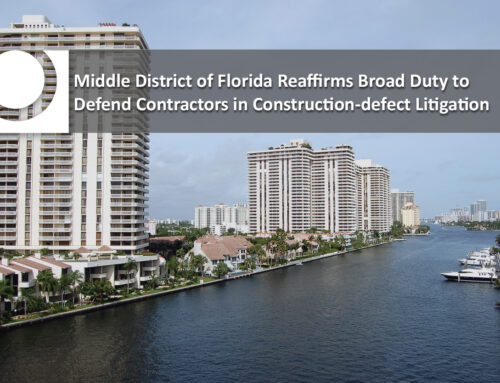Property owners want assurances that their contractors have sufficient liability insurance, which often means that contractors must submit certificates of insurance before starting work. But to the dismay of many owners after it’s too late (that is, after the contractor has caused some damage as a result of its work), certificates of insurance may provide only the illusion that an insurer will bring any money to the table.
This rude surprise can happen in many ways, but a recent California case illustrates why owners should not sleep easy. In Carvale Constr., Inc. v. Probuilders Specialty Ins., (Cal. Ct. App. June 12, 2014) (unpublished), two homeowners hired a contractor for an extensive remodeling project, which ended up in construction-defect litigation. The contractor’s insurer relied on several defenses well known to coverage counsel in construction-defect lawsuits, including the familiar dispute about whether defective construction is an “occurrence” triggering liability coverage.
But the insurer prevailed on other grounds that illustrate the difficulty that owners face in trying to ensure that their contractors, who often have shallow pockets or do not last long in business, at least have decent insurance. Although there is no way that the homeowners could have known this from a certificate of insurance, the contractor in Carvale had lied to its insurer in response to several questions on the policy application, including lowballing the contractor’s “gross receipts” in an apparent attempt to get a lower premium. That lower premium, however, cost the owners dearly, creating a “complete” defense for the insurer (even worse, the contractor had apparently failed to require that its subcontractors name the contractor as an additional insured on their policies).
Although the contractor’s dishonesty, and resulting coverage defense, would have been very difficult to discover before the owners allowed the contractor to start work in Carvale, reasonable diligence can avoid some pitfalls like this by reviewing the contractor’s actual policies — not just the certificate of insurance, which is not binding on insurers and describes little more than available policy limits. In Carvale, for example, the contractor’s policy included an exclusion for “property damage after work is completed arising out of ‘all roofing operations,’” even though the work apparently included “roofing operations.” Similarly, I’ve seen policies with exclusions for “multi-family” buildings — on a project to build apartments. Or an exclusion for damages arising from Exterior Insulation Finishing Systems — in the policy purchased by the EIFS sider. Ouch.
No amount of diligence will guarantee that a contractor’s insurer will actually show up with money to pay a claim, but owners cannot trust that contractors are purchasing sufficient insurance by relying only on the certificate of insurance, especially because, before the loss, the contractor has every incentive to pay for as little coverage as possible. Careful, thoughtful review of a contractor’s actual policies before the first hammer falls can prevent some of these coverage surprises.
Opinion reprinted from WestlawNext with permission of Thomson Reuters. If you wish to check the currency of this case by using KeyCite on WestlawNext, then you may do so by visiting www.next.westlaw.com.



